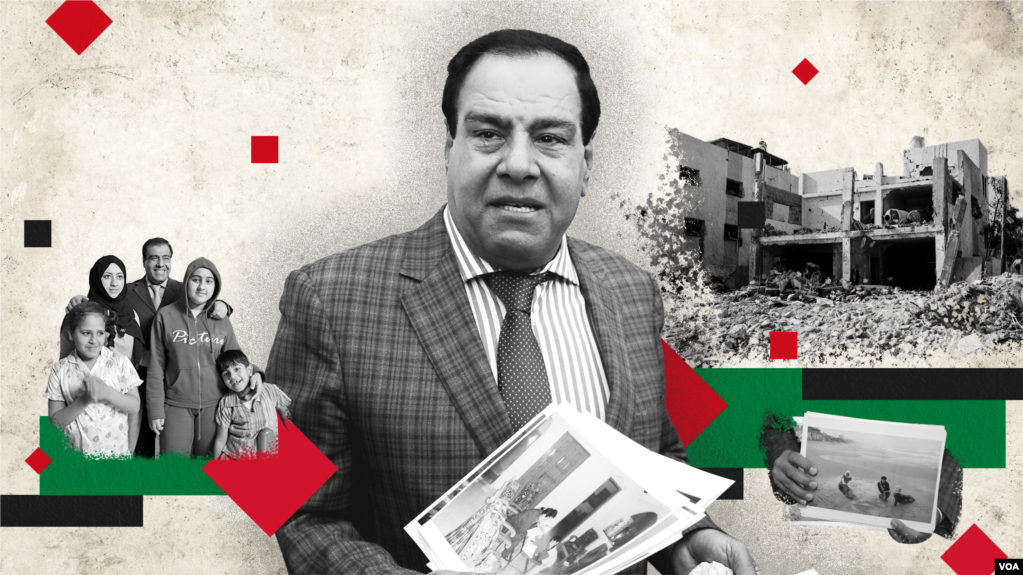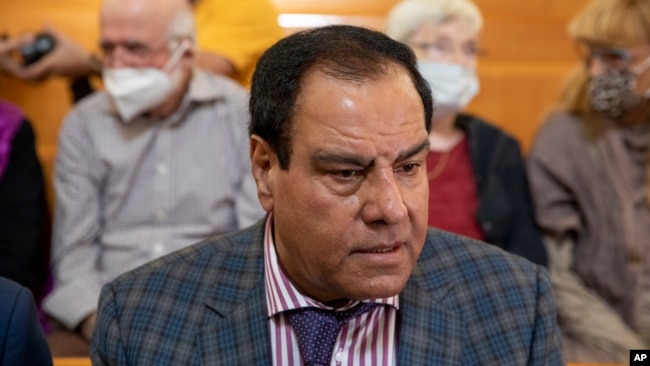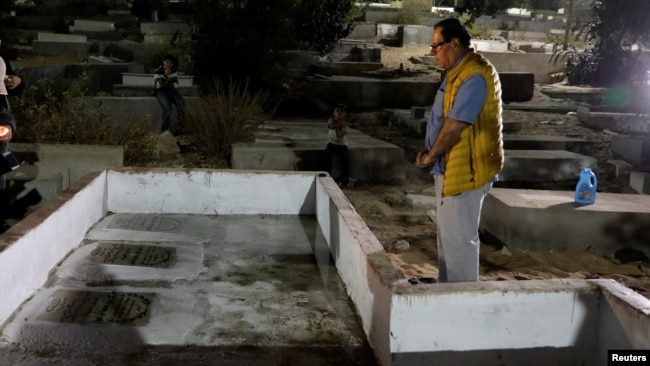He’s a proud Palestinian-Canadian who was born and raised in the Gaza Strip’s Jabalia refugee camp. He’s a Harvard-trained fertility specialist — the first Palestinian doctor to work in an Israeli hospital. He has been nominated five times for the Nobel Peace Prize.
October 24, 2023
Gabriel Levin

Izzeldin Abuelaish lost three daughters and a niece when an Israeli tank destroyed his Gaza home in 2009. He is now an activist for peace and wrote a memoir, "I Shall Not Hate."
(Photo illustration by VOA; AP, Reuters photos)
It’s hard to overstate Izzeldin Abuelaish’s influence as a professor, author and fierce activist.
But before all else, he’s a family man. Three of his daughters and a niece were killed nearly 15 years ago when an Israeli tank blasted away his Gaza home, just four months after his wife succumbed to leukemia.
He has turned his anguish not into hatred but a message for peace.
He wants the world to know that from the cinders of death and devastation, there’s a glimmer of hope for a future where no child, whether Palestinian or Israeli, has to die.
By Friday, January 16, 2009, the Gaza War was in its waning days. As the Israel Defense Forces, or IDF, were drawing their ground invasion to a close, all of Gaza held on for a cease-fire that wouldn’t come until the weekend.
Abuelaish witnessed the bloodshed firsthand as the barrage of bombs and missiles dragged on for three weeks straight.
He thought the worst had passed.
Two days prior, a tank rolled up to his apartment building. He watched from his window as it readied its cannon in his direction, though no combatants were anywhere to be seen.
In a panic, he phoned one of his Israeli friends, a TV anchor, who in turn pulled some strings to get the tank to back off.
“I thought we were safe. There was nowhere else to go. We stayed home, and nothing happened. Then two days later, on Friday, [the IDF] shelled my house,” Abuelaish told VOA.
“We were there waiting for a cease-fire, a negotiation. But human lives are not a matter of negotiation. We were waiting in line for who would be killed next.”

It’s hard to overstate Izzeldin Abuelaish’s influence as a professor, author and fierce activist.
But before all else, he’s a family man. Three of his daughters and a niece were killed nearly 15 years ago when an Israeli tank blasted away his Gaza home, just four months after his wife succumbed to leukemia.
He has turned his anguish not into hatred but a message for peace.
He wants the world to know that from the cinders of death and devastation, there’s a glimmer of hope for a future where no child, whether Palestinian or Israeli, has to die.
By Friday, January 16, 2009, the Gaza War was in its waning days. As the Israel Defense Forces, or IDF, were drawing their ground invasion to a close, all of Gaza held on for a cease-fire that wouldn’t come until the weekend.
Abuelaish witnessed the bloodshed firsthand as the barrage of bombs and missiles dragged on for three weeks straight.
He thought the worst had passed.
Two days prior, a tank rolled up to his apartment building. He watched from his window as it readied its cannon in his direction, though no combatants were anywhere to be seen.
In a panic, he phoned one of his Israeli friends, a TV anchor, who in turn pulled some strings to get the tank to back off.
“I thought we were safe. There was nowhere else to go. We stayed home, and nothing happened. Then two days later, on Friday, [the IDF] shelled my house,” Abuelaish told VOA.
“We were there waiting for a cease-fire, a negotiation. But human lives are not a matter of negotiation. We were waiting in line for who would be killed next.”

Palestinian Dr. Izzeldin Abuelaish sits inside Israel's Supreme Court for a hearing on his demand for an apology from Israel over a 2009 tank strike that killed three of his daughters and a niece in the Gaza Strip, in Jerusalem, Nov. 15, 2021.
Abuelaish remembers that horrific day as if it were yesterday, right down to the minute.
It was a quarter to 5 in the evening when his home was torn apart as if by a thunderclap. He rushed to his room to find his daughters struck dead, their bodies violently disfigured. His niece, too, was slain in the attack.
“These are my lovely, beautiful daughters, and I couldn’t recognize them,” he said in choked desolation. “I couldn’t recognize them. My daughter Mayar was decapitated. In that moment, I lost faith in humanity.”
Abuelaish described the scene in graphic detail. His daughters’ school journals and textbooks were streaked with blood pouring from fresh wounds.
“I see in my daughters every child, every girl, every human being. I am not free as long as others are not. I am not safe as long as others are not. We live in a world where we are all potential victims.”
It was that belief in equality that inspired Abuelaish’s activism. He published a memoir in 2010 called I Shall Not Hate and went on to create the Daughters for Life Foundation, a charity to help young women in the Middle East afford college.
Now a Canadian citizen, for over a decade he has taught lecture halls of aspiring doctors at the University of Toronto. Few people know the transformative power of an education better than Abuelaish, who made the most of refugee camp schooling before going on to some of the world’s finest universities.
He tried unsuccessfully to sue over the 2009 shelling, working his way up to Israel’s Supreme Court before his case was rejected two years ago. The IDF admitted the deaths were an accident, or “collateral damage” as they put it, but Abuelaish still hasn’t received the apology he had asked for time and again.

Abuelaish remembers that horrific day as if it were yesterday, right down to the minute.
It was a quarter to 5 in the evening when his home was torn apart as if by a thunderclap. He rushed to his room to find his daughters struck dead, their bodies violently disfigured. His niece, too, was slain in the attack.
“These are my lovely, beautiful daughters, and I couldn’t recognize them,” he said in choked desolation. “I couldn’t recognize them. My daughter Mayar was decapitated. In that moment, I lost faith in humanity.”
Abuelaish described the scene in graphic detail. His daughters’ school journals and textbooks were streaked with blood pouring from fresh wounds.
“I see in my daughters every child, every girl, every human being. I am not free as long as others are not. I am not safe as long as others are not. We live in a world where we are all potential victims.”
It was that belief in equality that inspired Abuelaish’s activism. He published a memoir in 2010 called I Shall Not Hate and went on to create the Daughters for Life Foundation, a charity to help young women in the Middle East afford college.
Now a Canadian citizen, for over a decade he has taught lecture halls of aspiring doctors at the University of Toronto. Few people know the transformative power of an education better than Abuelaish, who made the most of refugee camp schooling before going on to some of the world’s finest universities.
He tried unsuccessfully to sue over the 2009 shelling, working his way up to Israel’s Supreme Court before his case was rejected two years ago. The IDF admitted the deaths were an accident, or “collateral damage” as they put it, but Abuelaish still hasn’t received the apology he had asked for time and again.

Izzeldin Abuelaish, a Palestinian doctor, visits the graves of his three daughters who were killed during the 2009 war in Gaza, at a cemetery in northern Gaza Strip, Nov. 15, 2021.
At least once or twice a year, he visits Gaza. The first thing he does there is go to his daughters’ graves to speak to them.
He’s confident his girls are out there somewhere, listening intently to each word. “They are only farther away from me now,” he said.
He never had the chance to say goodbye to them. His daughters couldn’t even be laid to rest in the same plot as their mother because the graveyard she’s buried in is under the strict command of the IDF.
Today, Abuelaish said he’s losing faith in humanity all over again as the death toll in Gaza spirals and the familiar roar of Israeli airstrikes and missiles returns. A number of his family members have perished in the last two weeks.
After Hamas unleashed the deadliest single-day massacre of Jews since the Holocaust, butchering everyone from infants to the elderly with callous indifference, Prime Minister Benjamin Netanyahu vowed a “mighty vengeance.”
Everyday Palestinians have had to bear the brunt of the IDF’s counteroffensive.
More than 2,000 Gazan children have reportedly been killed and 1.4 million Palestinians have fled their homes since the war broke out.
All Abuelaish ever wanted is peace.
And the only path toward that, he insisted, is in recognizing that all humankind is deserving of the same reverence and goodwill, that no identity is superior to the next and that the law must view each person equally.
“Palestinians and Israelis, we’re all in the same boat,” Abuelaish said. “We have to reach the shore together safely, peacefully.”
“I think it’s fair to say that there won’t be reconciliation between [Israelis and Palestinians] without Abuelaish’s perspective gaining serious ground,” said Hussein Ibish, a senior resident scholar at the Arab Gulf States Institute in Washington. “It’s ultimately about human beings treating each other as human beings.”
The world has a long way to go before that happens. The U.S. is no exception.
The FBI released data days ago finding that hate crimes surged to all-time highs last year and the year before that. On Sunday, the Department of Homeland Security warned law enforcement across the nation of swelling Islamophobia and antisemitism. Police in New York City and Los Angeles are already recording dramatic upticks in attacks against Jewish and Muslim residents.
Earlier this month, a 6-year-old Palestinian-American boy named Wadea Al-Fayoume was stabbed to death in his home by a racist landlord outside Chicago, according to the local sheriff’s office.
“The poison of hate is spreading everywhere,” Abuelaish said.
In the run-up to the apparent hate crime, bigotry has been on the rise across America because of “people who should know better,” said Maya Berry, the executive director of the American Arab Institute.
One day before Al-Fayoume was slaughtered, Florida Governor Ron DeSantis, who is running for president, called all Palestinians in the Gaza Strip antisemitic and vowed to turn them away as refugees.
“At times like this,” Berry said, “we need our elected officials, we need our leaders, we need our civil society organizations and we need our media to not fan the flames of hatred.”
“There has been, I think, a very unfortunate and morally bankrupt civil discourse that’s taken hold here,” Berry added. “If it’s not checked and if it’s not stopped, it’s absolutely putting communities at risk.”
As a doctor, hatred never occurred to Abuelaish as a real option.
“When I deliver babies, I don’t discriminate between Muslim, Jewish and Christian. And with all my God-given skills, I’ll always advocate for their safety, security and freedom.”
At least once or twice a year, he visits Gaza. The first thing he does there is go to his daughters’ graves to speak to them.
He’s confident his girls are out there somewhere, listening intently to each word. “They are only farther away from me now,” he said.
He never had the chance to say goodbye to them. His daughters couldn’t even be laid to rest in the same plot as their mother because the graveyard she’s buried in is under the strict command of the IDF.
Today, Abuelaish said he’s losing faith in humanity all over again as the death toll in Gaza spirals and the familiar roar of Israeli airstrikes and missiles returns. A number of his family members have perished in the last two weeks.
After Hamas unleashed the deadliest single-day massacre of Jews since the Holocaust, butchering everyone from infants to the elderly with callous indifference, Prime Minister Benjamin Netanyahu vowed a “mighty vengeance.”
Everyday Palestinians have had to bear the brunt of the IDF’s counteroffensive.
More than 2,000 Gazan children have reportedly been killed and 1.4 million Palestinians have fled their homes since the war broke out.
All Abuelaish ever wanted is peace.
And the only path toward that, he insisted, is in recognizing that all humankind is deserving of the same reverence and goodwill, that no identity is superior to the next and that the law must view each person equally.
“Palestinians and Israelis, we’re all in the same boat,” Abuelaish said. “We have to reach the shore together safely, peacefully.”
“I think it’s fair to say that there won’t be reconciliation between [Israelis and Palestinians] without Abuelaish’s perspective gaining serious ground,” said Hussein Ibish, a senior resident scholar at the Arab Gulf States Institute in Washington. “It’s ultimately about human beings treating each other as human beings.”
The world has a long way to go before that happens. The U.S. is no exception.
The FBI released data days ago finding that hate crimes surged to all-time highs last year and the year before that. On Sunday, the Department of Homeland Security warned law enforcement across the nation of swelling Islamophobia and antisemitism. Police in New York City and Los Angeles are already recording dramatic upticks in attacks against Jewish and Muslim residents.
Earlier this month, a 6-year-old Palestinian-American boy named Wadea Al-Fayoume was stabbed to death in his home by a racist landlord outside Chicago, according to the local sheriff’s office.
“The poison of hate is spreading everywhere,” Abuelaish said.
In the run-up to the apparent hate crime, bigotry has been on the rise across America because of “people who should know better,” said Maya Berry, the executive director of the American Arab Institute.
One day before Al-Fayoume was slaughtered, Florida Governor Ron DeSantis, who is running for president, called all Palestinians in the Gaza Strip antisemitic and vowed to turn them away as refugees.
“At times like this,” Berry said, “we need our elected officials, we need our leaders, we need our civil society organizations and we need our media to not fan the flames of hatred.”
“There has been, I think, a very unfortunate and morally bankrupt civil discourse that’s taken hold here,” Berry added. “If it’s not checked and if it’s not stopped, it’s absolutely putting communities at risk.”
As a doctor, hatred never occurred to Abuelaish as a real option.
“When I deliver babies, I don’t discriminate between Muslim, Jewish and Christian. And with all my God-given skills, I’ll always advocate for their safety, security and freedom.”
No comments:
Post a Comment